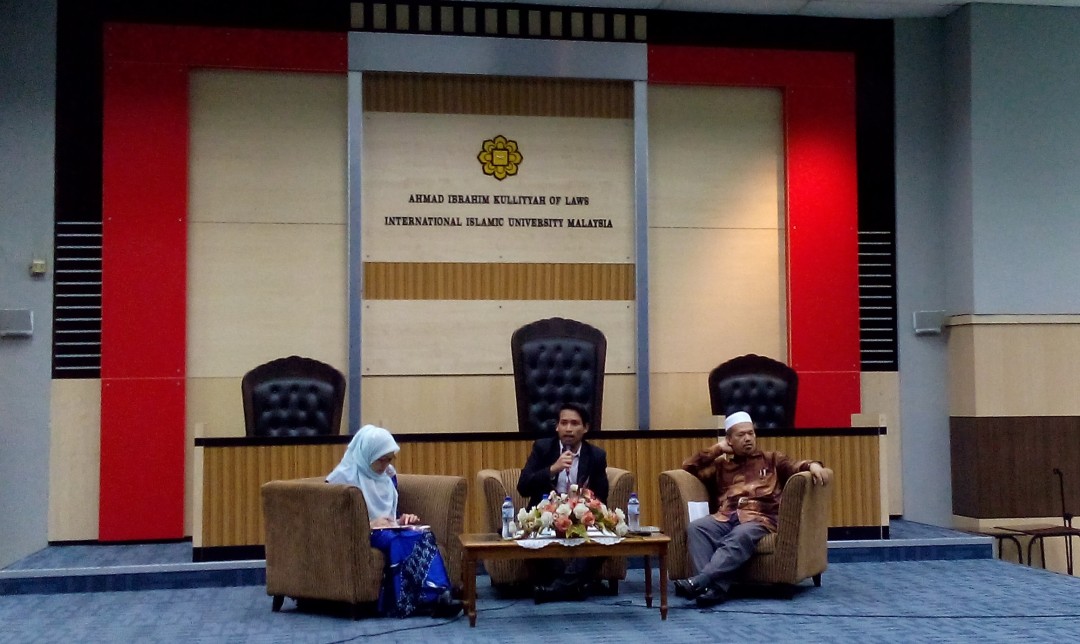By Siti Syuhada Abu Hasan
GOMBAK, 22Â April 2015: More than 100 students participated in a talk organised by Education Secretariat of Law Students Society (LAWSOC) held at the Moot Court, Ahmad Ibrahim Kulliyyah of Law (AIKOL), IIUM. The talk was organised to expose the students to the practicality of the Hudud law in Malaysia.
The speakers were in their area of specialisation: Associate Prof. Dr. Shamrahayu Aziz, Principal Fellow at the Institut Kefahaman Islam Malaysia (IKIM) and Ustaz Hamid Jusoh, a lecturer in the Department of Islamic Law, AIKOL. The moderator was the President of LAWSOC, Fadhli Umar.
The topic of discussion was the implementation of Hudud law in Malaysia at the present time. The implementation of Hudud law in Malaysia, has become one of the interesting issues and a focus of debates but still have not yet reached a conclusion. More questions are often raised than answers received in public forums on this issue.
Punishments concerning Hudud are a matter of fixed punishments because these have been fixed by Quran and Sunnah. It brings meaning that the Hudud law cannot be increased, decreased, or altered by anyone even the head of the state. If the accused is found guilty, he has no right to appeal or to reduce the punishment.
The issue of implementation of Hudud law in Malaysia is not new. It seems harsh as it involved the right of Allah for a crime. This issue has been raised by the Islamic opposition party in 1997, however, their proposal to implement Hudud law in Malaysia became controversial due to different views of the society and the politicians.
Many people are becoming aware on the matters concerning Islamic Jurisprudence. Problems relating to judiciary nowadays are not restricted for the lawyers or judges to discuss but by laymen as well which has opened up their eyes and many have started talking about it academically.
Every person has his or her own views but sometimes the views are not based on relevant grounds. Many people have negative thinking when arriving at Hudud issue. This punishment is the one that seems to them do not fit the laws of certain countries and may be could not be implemented at all.
Moreover, our country consists of multi-racial society that seems impossible to implement this law. Even though there are arguments that the Hudud law should not be implemented in Malaysia as there are many controversial issues of its implementation, still it should not be rejected on the whole without giving any consideration.
The second speaker, Ustaz Hamid Jusoh, said: œEverything must be based on knowledge, people do not know the issue, then they jump into conclusion and object the issue.’
Based on Maqassid Syariah, he said, everything must be according to the purpose. He also stressed about the dignity of the person involved must be protected.
When the moderator asked the expert in Constitution Law, about the implementation of Hudud, whether or not it is possible in Malaysia, this was her answer: “Hudud even though just a small part of Islamic Criminal Law and Islamic jurisprudence, but it must be upheld as much as we can. Although it is hard to accept new changes, we are duty bound to enforce the Islamic law. It is true that the government is the powerful authority to enforce the Hudud law in our country but the burden is not only on the government, but the Muslims as a whole.”
In my view, as the religious matter is a matter of the state, there must be an action taken by the state concerned and the state should do it hand in hand to make sure the punishment is organised in each state. Many objections had been made against this application but we must accept that it is not wrong to implement Hudud as long as we adhere to it and accept it as it is.
The Constitution is not restricting the Hudud implementation, and this country does not reject the Islamic Hudud per se. But we need to prepare and be ready, otherwise, there will be a chaotic situation.***
